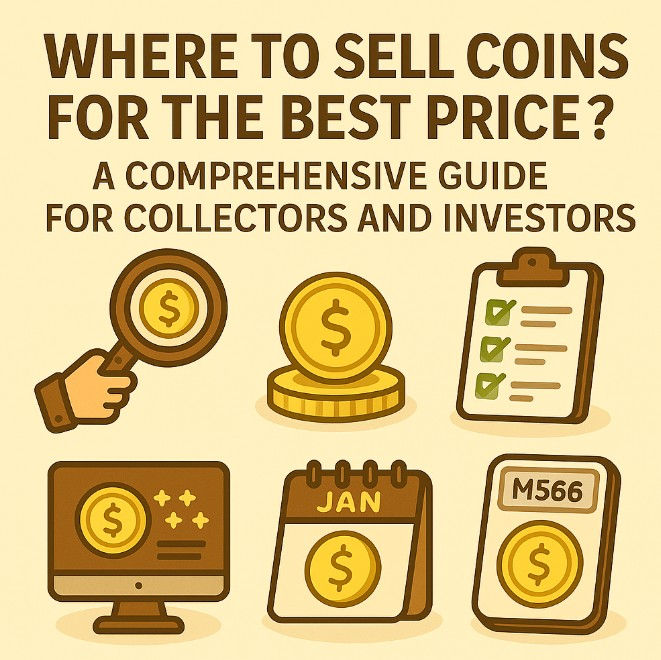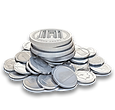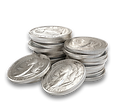Where to Sell Coins for the Best Price? A Comprehensive Guide for Collectors and Investors
- GoldsilverJapan

- Sep 19, 2025
- 5 min read
Whether you're a seasoned numismatist, a casual collector, or someone who inherited a coin collection, one question inevitably arises when the time comes to cash out: Where can I sell my coins for the best price?
The answer isn't as straightforward as naming a single platform or dealer. The best place to sell coins depends on several factors, including:
The type and rarity of your coins
Market demand
Your location
Your desired level of convenience
Whether you're selling bullion, collector coins, or rare numismatics
In this guide, we’ll walk you through everything you need to know about getting the maximum value when selling coins, including where to sell, how to evaluate offers, how to avoid scams, and tips to maximize your profits. Whether you're selling gold coins, silver coins, pre-1933 U.S. coins, commemoratives, or foreign coins, this is your ultimate reference.
1. Understanding Your Coin’s Value
Before selling your coins, you need to know what you have.
A. Coin Types Matter
Bullion Coins (e.g., American Eagles, Canadian Maples, Britannias): Valued primarily for metal content.
Numismatic Coins: Rare or historical coins valued beyond metal content due to rarity and collector demand.
Semi-Numismatic Coins: A blend of bullion and collectible coins, often with modest premiums.
Junk Silver: 90% silver coins (usually pre-1965 U.S. dimes, quarters, halves) traded for melt value.
Foreign Coins: Some foreign coins can be highly valuable depending on rarity and historical significance.
B. Factors That Affect Price
Condition (Grade): Higher grades command higher prices.
Rarity: Scarcity can drastically increase value.
Demand: More buyers = better prices.
Certification: Coins graded by PCGS, NGC, or ANACS can fetch more.
Current Market Trends: Gold and silver spot prices fluctuate daily.
Pro Tip: Use online tools like Numista, NGC Price Guide, or PCGS Price Guide to research your coin’s value before accepting any offer.
2. Where to Sell Coins: Top Options (With Pros & Cons)
A. Local Coin Shops (LCS)
Best for: Quick sales, trusted relationships, beginner-friendly
Pros:
Immediate cash payment
Face-to-face negotiation
No shipping or listing hassle
Cons:
Limited buyer pool
May offer below-market price due to business overhead
Tip: Visit multiple shops to compare offers.
B. Coin Shows
Best for: Rare coins, networking with dealers and collectors
Pros:
Access to multiple potential buyers
Opportunity to get appraisal and sell on-site
Great for numismatic items
Cons:
Requires travel
Not ideal for quick liquidation
C. Online Marketplaces
1. eBay
Best for: Certified coins, high-demand collector items
Pros:
Global buyer reach
Auction or fixed price format
Seller control over pricing
Cons:
Fees (10–13%)
Risk of buyer scams
Returns or disputes
Pro Tip: Sell graded coins only and always insure shipments.
2. Etsy
Best for: Unique or artistic coins, jewelry made from coins
Pros:
Niche collector audience
Higher markup potential
Cons:
Not designed for bullion trading
Smaller buyer base
D. Auction Houses
Best for: High-value or rare coins
Top Auction Houses:
Heritage Auctions
Stack’s Bowers
GreatCollections
Sotheby’s (rarely for coins)
Pros:
Access to serious collectors and investors
Professional marketing
High final bids possible
Cons:
Seller premiums (15–20%)
Delayed payment after sale
E. Bullion Dealers and Precious Metals Shops
Best for: Bullion coins like American Gold Eagles, Silver Maples, Krugerrands
Top Dealers:
APMEX
JM Bullion
Kitco
GoldSilverJapan Sell Your Coins | Buyback & Appraisal | GoldSilverJapan
Pros:
Transparent pricing tied to spot prices
Buyback programs
Secure transactions
Cons:
Premiums vary
Must follow their testing or authentication process
F. Peer-to-Peer Selling (Online Forums or Groups)
Best for: Experienced sellers, niche collector communities
Examples:
Reddit’s r/coins or r/pmsforsale
Facebook coin groups
Coin Community forums
Pros:
No selling fees
Direct buyer communication
Potential for full market value
Cons:
Risk of scams
No seller protection
Requires vetting buyers and handling shipping
3. Selling Coins in Japan: What to Know
If you're located in Japan, you're in a unique position. Japan has an active, growing interest in precious metals investment and collectible coins, but you also need to navigate language, taxation, and local customs.
Trusted Japanese Coin Dealers:
GoldSilverJapan(ゴールドシルバージャパン)Sell Your Coins | Buyback & Appraisal | GoldSilverJapan
Sells and buys bullion coins (e.g., Austrian Philharmonics, Britannias, Krugerrands)
Known for fair pricing and secure transactions
English-speaking customer support available
Online store with mail-in options for sellers
Other options in Japan include:
Tanaka Kikinzoku – more focused on gold bars, less on collector coins
Tokuriki Honten – one of Japan's oldest precious metals companies
Pro Tip: For overseas sales, verify all shipping and customs regulations when mailing coins.
4. Tips to Maximize the Price of Your Coins
A. Know the Spot Price
Always check live gold and silver prices before selling bullion coins. Spot prices change daily and affect what you’ll get.
Good Resources:
Kitco
BullionVault
GoldSilverJapan’s live chart
B. Get Coins Graded
If your coin is potentially valuable (e.g., 1909-S VDB penny, 1932-D Washington quarter), grading by NGC or PCGS can significantly increase its worth.
C. Sell at the Right Time
Markets are seasonal. Prices tend to be higher:
During economic uncertainty
When inflation rises
At the beginning of the year (bullion demand spikes)
D. Photograph Your Coins Professionally
A clear, high-resolution image helps build trust, especially if selling online. Show obverse, reverse, and edges. Include certification if available.
E. Avoid “We Buy Gold” Kiosks
These pop-up gold buyers or mail-in gold buying services often pay significantly less than your coin is worth—especially if it’s a rare coin or has numismatic value.
5. Coin Selling FAQs
Q: Can I sell coins to a bank?
A: Most modern banks no longer buy coins. They may exchange foreign currency but not collectible or bullion coins.
Q: Is it better to sell my coins online or in person?
A: If you're looking for top dollar and are willing to wait, online offers (via auction or collector sites) tend to fetch better prices. If you need fast cash, a local coin shop is more efficient.
Q: Do I have to pay taxes when I sell coins?
A: In many countries, profits from selling precious metals are subject to capital gains tax. In the U.S., coins are considered "collectibles" and taxed accordingly. In Japan, short-term profits can also be taxed. Always consult a tax professional.
Q: How can I avoid scams when selling coins?
Use insured, trackable shipping
Never accept overpayment/refund scams
Use platforms with buyer/seller protection
Get multiple appraisals
Avoid wire transfers or suspicious payment methods
Q: Can I sell damaged or cleaned coins?
A: Yes, but expect a lower offer. Cleaning a coin removes its original surface and can significantly reduce its value, especially to collectors. However, bullion buyers may still pay based on metal content.
6. Summary Table: Where to Sell Coins
Selling Option | Best For | Pros | Cons |
Local Coin Shops | Bullion, circulated coins | Fast, face-to-face | Lower prices |
Coin Shows | Rare & collectible coins | Multiple offers, networking | Time & travel involved |
eBay | Graded/Certified coins | Wide audience, control price | Fees, scams |
Auction Houses | High-value numismatic coins | Professional, high exposure | High commission, slow payout |
Bullion Dealers | Bullion coins | Transparent pricing, easy | Shipping required |
Peer-to-Peer Platforms | Experienced collectors | Max profits, no fees | Risk of scams |
Final Thoughts
Selling coins is both an art and a science. To truly get the best price, it’s essential to know your coins, understand the market, and choose the right selling channel. The effort you put into research, presentation, and negotiation can translate into hundreds or even thousands of dollars in extra returns.
If you’re in Japan, platforms like GoldSilverJapan offer the perfect balance between local knowledge and international standards. With secure transactions, live spot prices, and multilingual support, they’re an ideal partner whether you're selling one coin or an entire collection.
So the next time you wonder, “Where should I sell my coins for the best price?” — you’ll know exactly where to start.











Comments